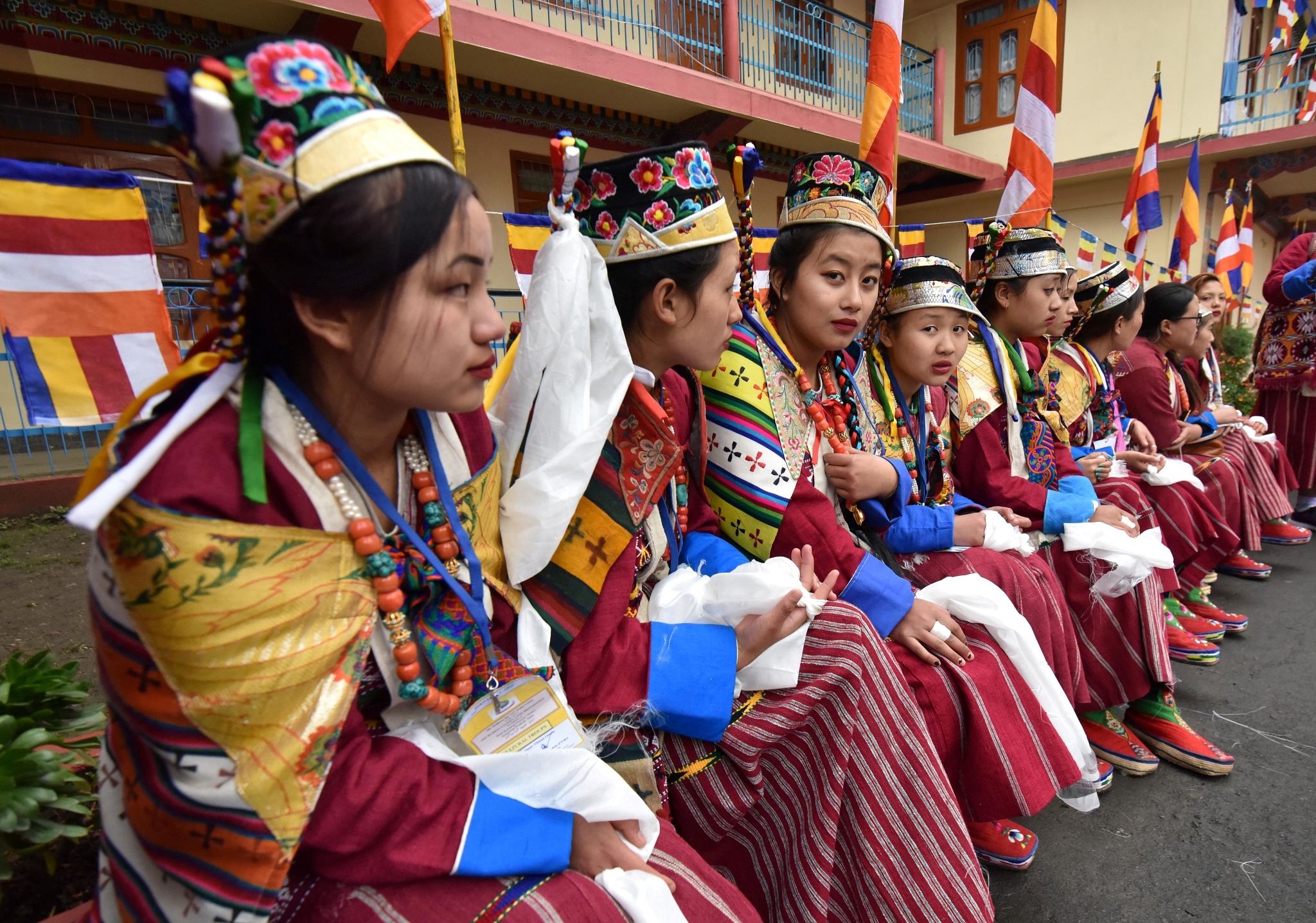Politics
The Ongoing War In Arunachal Pradesh: How Aggressive Proselytisation Is Killing Indigenous Faiths
- Losing ‘souls’ to aggressive religious bodies is a far more dangerous threat to the vibrancy and survivability of India’s multicultural, mutli-religious fabric.

Children from the Monpa tribe in Arunachal Pradesh (BIJU BORO/AFP/Getty Images)
In August 2017 the Pema Khandu led BJP government in Arunachal Pradesh approved the establishment of the "Department of Indigenous Faith & Cultural Affairs" at a meeting chaired by the Chief Minister.
The Chief Minister had stated that the indigenous communities of Arunachal Pradesh need to take 'specific steps to preserve and protect them from disappearing into oblivion'.
According to news reports Christian lobbying organisations quickly began opposing the government move. They alleged that ‘ through its move to create a department to protect the indigenous faiths, the state government was taking aim at the Church. ‘
The secretary of the Arunachal Christian Forum (ACF) was quoted as saying that the government’s aim was “to target the Church by putting pressure on it, but the government should not interfere in religious matters and treat all religious groups equally”.
Demographic data – as pointed out by many– has been largely pointing to an increasing number of conversions in the state.
In 2001 Christians formed 18.7 per cent of the population in Arunachal Pradesh. A decade later, in 2011 this number has been reported as 30 per cent, officially. The actual number is likely to be much higher.
The increase in Christian population is also accompanied by the diminishing of local spiritual traditions like Donyi-Polo, Rangfraa and Buddhist tribal groups. The Christian claim is that the teachings of Jesus Christ attract the tribals who face a lot of problems. Christianity is said to have 'reformed' the tribes.
A look into the incidents of past one decade shows another picture which is not just different but much scarier than the benign picture provided by lobbyist groups.
In August 2004, months after the United Progressive Alliance (UPA) had come to power at the centre, four tribal villages in Tirap – Changlang district in Arunachal Pradesh had some visitors. The visitors carried assault automatic weapons and told the villagers that they should either convert to Christianity or face execution. The visitors were secessionists belonging to the two rival factions of NSCN – appropriately named National Socialist Council of Nagaland, a terror group fighting for a Christian socialist theocracy. The villagers had to flee fearing torture and death. They belonged to the indigenous religious streams of Arunachal and a syncretic tradition of Buddhism. (The Assam Tribune, 23 August, 2004)
Such gun-point conversions were condemned by the joint Buddhist session of the Purvanchal Buddhist Bhikkhu Sangha and Purvanchal Buddhist Association of both the states of Assam and Arunachal Pradesh. They strongly condemned ‘the heinous atrocities committed by the militants on the peace-loving Buddhists and tribes’ and issued a press release saying that aggressive proselytism in Arunachal Pradesh was a violation of human rights guaranteed in the Constitution.
What followed was a deafening silence from both the mainstream media and the government. Throughout the UPA government’s decade-long stint, aggressive proselytising continued in Arunachal Pradesh, so much so that in 2010 when Tikhak Buddhists of Changlang district in the state celebrated Buddha Purnima, security forces had to provide them protection. The NSCN had issued a threat to Buddhist villagers to convert to Christianity. They were also warned not to celebrate Buddhist functions and if they did, they would face dire consequences.
An agonised Venerable Aggadhamma, the highest Buddhist leader of the province, told reporters that the NSCN terrorists were setting seven day deadlines for villagers to convert to Christianity. Ven Aggadhamma even sent a memorandum to then prime minister Manmohan Singh, the Union Home Ministry, the President as well as the Minority Commission. (The Indian Express', 28 May, 2010)
It is a telling comment on the nature of mainstream media that nothing except minimal reportage happened. No outrages, no op-eds and no cartoons were published against such aggressive attempts to convert people of indigenous faith. That the hyper-proselytisation drive in Arunachal Pradesh correlates with the UPA regime period may not be accidental at all. The rate of conversions has been high despite there being legal restrictions against aggressive conversions in the state.
The current Khandu government, meanwhile, has been made to bow to the pressures of international lobbying groups and bodies such as the ACF. It is apparently toying with the idea of using a different name for the body being set up for protesting indigenous culture and faiths.
That a strategically important border state of India has to go through such issues is a cause of deep worry. Conversions in this state are not mere problems of religion but of utmost strategic importance given the presence of Christian terrorist organisations in the region.
When we lose territory there is a possibility that we can regain it. But losing ‘souls’ to aggressive religious bodies is a far more dangerous threat to the vibrancy and survivability of India’s multicultural, mutli-religious fabric.
Support Swarajya's 50 Ground Reports Project & Sponsor A Story
Every general election Swarajya does a 50 ground reports project.
Aimed only at serious readers and those who appreciate the nuances of political undercurrents, the project provides a sense of India's electoral landscape. As you know, these reports are produced after considerable investment of travel, time and effort on the ground.
This time too we've kicked off the project in style and have covered over 30 constituencies already. If you're someone who appreciates such work and have enjoyed our coverage please consider sponsoring a ground report for just Rs 2999 to Rs 19,999 - it goes a long way in helping us produce more quality reportage.
You can also back this project by becoming a subscriber for as little as Rs 999 - so do click on this links and choose a plan that suits you and back us.
Click below to contribute.
Latest